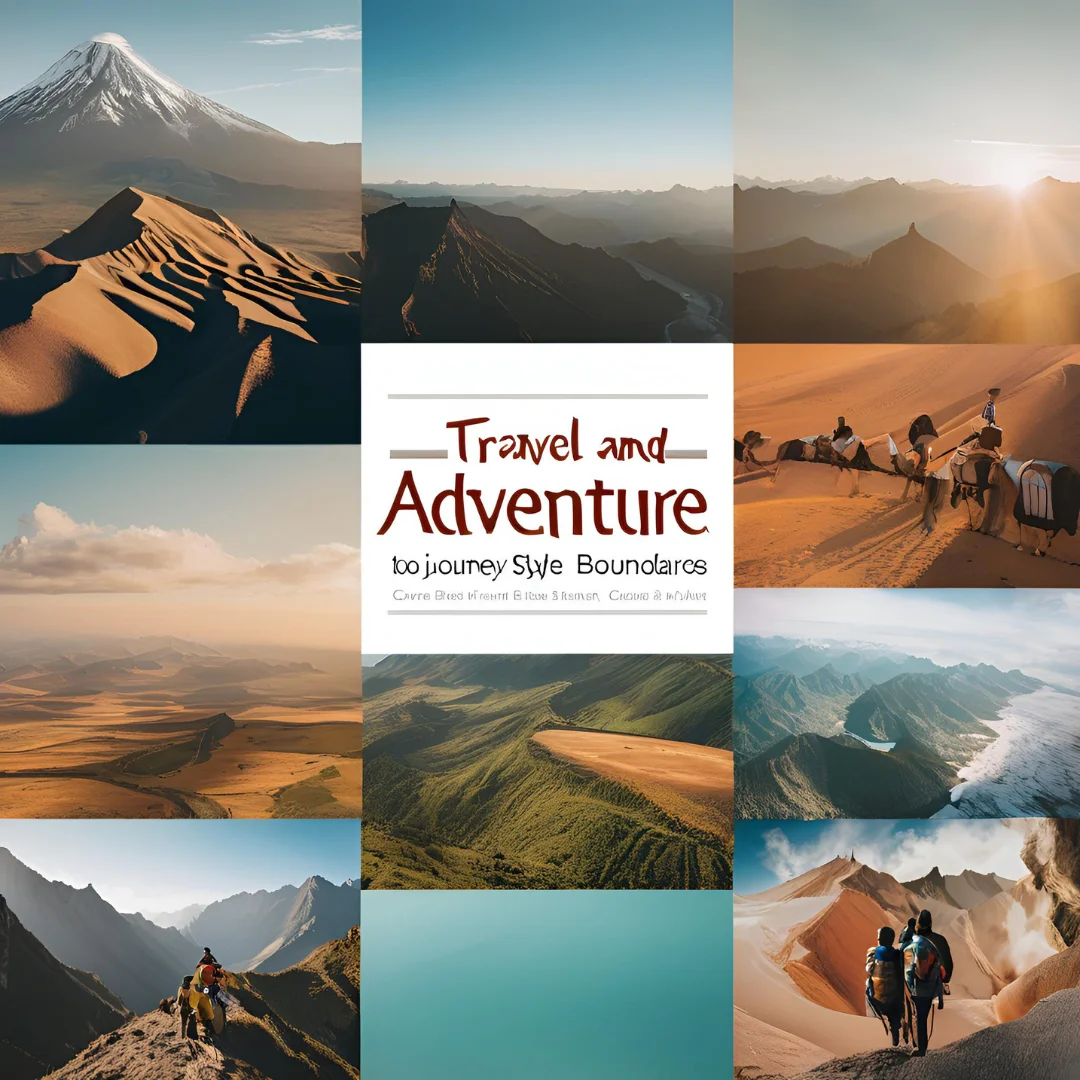Adventure and travel are more than just fun pursuits; they are significant means of fostering personal development, learning about different cultures, and making lifelong memories. Every year, millions of people travel the world, drawn by the irresistible attraction of exploring new places, meeting people from different cultures, and venturing into the unknown. This blog examines the many facets of adventure and travel, emphasizing the different kinds of travel experiences, the importance of preparation, and the significant effects these trips may have on our lives.
The Essence of Travel and Adventure
Adventure and travel have a profound place in human nature. Exploration and understanding of the globe are ageless goals shared by all travelers, from the first explorers who sailed to new places to contemporary tourists looking for singular experiences.
The Spirit of Exploration
The spirit of discovery lies at the core of adventure and travel. People are naturally curious, which motivates them to explore new areas, leave their comfort zones, and widen their perspectives. Traveling creates a sense of adventure and discovery, whether it's by touring a busy city, hiking through uncharted territory, or experiencing a foreign culture.
Cultural Immersion and Connection
Immersion in several cultures can be achieved through travel, which offers an unprecedented experience. Engaging with local traditions, customs, and lifestyles enables travelers to get a greater perspective of the world. Immersion in a new culture involves more than just sightseeing; it involves making new friends, experiencing regional cuisine, taking part in celebrations, and picking up subtleties of a new way of life. These encounters deepen our awareness of the world and increase our capacity for empathy and variety appreciation.
Personal Growth and Self-Discovery
Traveling presents a wealth of experiences and difficulties that frequently result in profound personal development. Traveling develops resilience, adaptability, and confidence in oneself, whether it is through navigating a different city, getting through language obstacles, or adjusting to new environments. As travelers consider their experiences and develop understanding of their values, beliefs, and goals, it also offers a chance for self-discovery.
Types of Travel and Adventure
Travel and adventure are broad and varied, appealing to a broad spectrum of tastes and passions. Here are a few examples of well-liked travel experiences:
Backpacking and Budget Travel
Budget travel and backpacking are ideal for people who value experiences above luxury. This kind of travel has a strong emphasis on flexibility and affordability, and it frequently includes inexpensive lodging options like guesthouses or hostels, public transit, and basic meals. As a means of having real conversations with locals and getting a better grasp of the area, backpackers frequently go for off-the-beaten-path locations. Backpacking's spontaneity and independence can result in memorable experiences and unanticipated adventures.
Luxury Travel
A premium experience is provided by luxury travel for those who value comfort and exclusivity. This kind of travel usually entails upscale lodging, exquisite cuisine, exclusive tours, and individualised services. The best that a location has to offer is available to luxury tourists, including private boat charters, exclusive cultural events, and opulent resorts in far-flung locales. This kind of travel lets you unwind and treat yourself while discovering new locations.
Adventure Travel
The whole point of adventure travel is to push your physical and mental limits in search of excitement. It includes a broad variety of pursuits like wildlife safaris, white-water rafting, scuba diving, rock climbing, and trekking. Natural scenery and the thrill of pushing oneself in unfamiliar settings entice adventure travelers. This kind of travel frequently emphasizes sustainability and conservation while fostering a close relationship with the natural world.
Eco-Tourism and Sustainable Travel
Sustainable travel and eco-tourism place a strong emphasis on ethical and ecologically good behavior. This kind of travel aims to help local communities and reduce its detrimental effects on the environment. Engaging in low-impact activities like hiking and birdwatching, volunteering for conservation efforts, and lodging in eco-friendly lodges are all examples of eco-tourism. Reducing one's carbon footprint through thoughtful decisions about lodging, transportation, and consumption is another aspect of sustainable travel.
Cultural and Historical Travel
Travel that is culturally and historically focused aims to learn about the customs and legacy of the place being visited. Visiting historical monuments, museums, cultural festivals, and indigenous villages are common travel destinations for this kind of tourism. Travelers can broaden their perspective of the world by learning about the customs, history, and artwork of many cultures. Travelers that value cultural diversity and history will find this kind of trip to be perfect.
Solo Travel
People can find empowerment when they travel alone and can see the world at their own pace. It provides a distinct sensation of autonomy and freedom, allowing visitors to design their own schedules, act on impulse, and completely immerse themselves in their environment. Because it promotes reflection and personal development, traveling alone can be a voyage of self-discovery.
Planning for a Memorable Travel Experience
For a trip to be safe, pleasurable, and gratifying, careful planning is essential. The following are some crucial factors to think about:
Research and Itinerary Planning
Optimizing the vacation experience requires careful planning of the schedule and extensive study. This include investigating potential travel locations, becoming familiar with regional customs and culture, determining must-see sights, and organizing logistics like lodging and transportation. An agenda should strike a balance between planned activities and downtime and unplanned discovery.
Packing Essentials
Comfort and convenience depend on packing according to the itinerary and intended activities. This includes appropriate attire for the weather, cozy shoes, travel documents, any prescription drugs, and any specialist equipment needed for outdoor pursuits like hiking or diving. It's also critical to pack lightly and effectively to promote flexibility and ease of mobility.
Safety and Health Considerations
During travel, health and safety come first. It's critical to stay up to date on local regulations, health hazards, and travel advisories as well as the state of safety at your location. Vaccinations, travel insurance, and bringing a basic first aid kit should all be taken into account by travelers. Having backup plans, emergency contacts, and copies of critical documents on hand is a good idea in case of unforeseen circumstances.
Cultural Sensitivity and Respect
It's important to visit new areas with cultural sensitivity and respect. This entails being aware of how one's activities affect the neighborhood and environment, dressing appropriately, honoring religious and cultural conventions, and being aware of local customs. Being respectful to others promotes good relationships and improves the trip experience.
Conclusion
Adventure and travel provide a special and rewarding way to see the world. These travels offer priceless chances for personal development, cross-cultural knowledge, and life-changing experiences, whether you're touring busy cities, hiking through challenging terrain, or fully immersing yourself in other cultures. We become more receptive to the world's treasures and the limitless opportunities that come with travel when we embrace the spirit of adventure and discovery. So gather your belongings, head out, and start the adventure!




